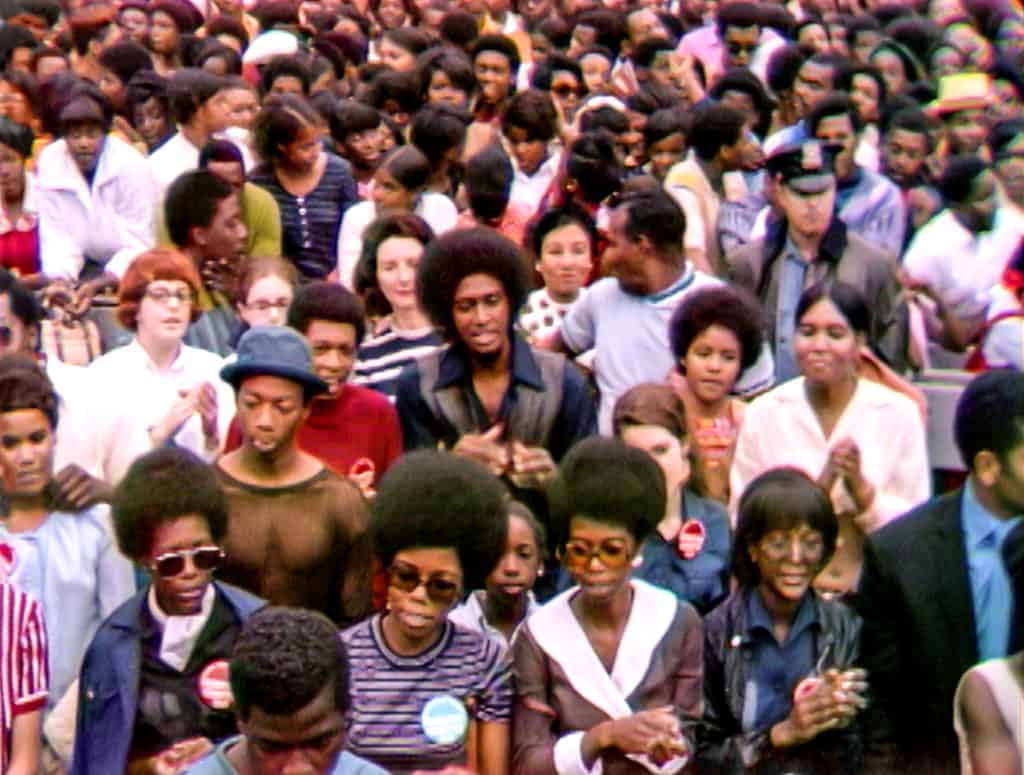Moviegoer: Summer of Soul (…Or, When the Revolution Could Not Be Televised)

Woodstock wasn’t the only major music festival in 1969
By Diana Beechener
In 1969, hundreds of thousands of people gathered in New York to hear some of the biggest musical acts of the day. The concert series became a cultural touchstone for those who came. Over 300,000 people attended, but none of them were camping in mud to see Jimmy Hendrix.
Though the Harlem Cultural Festival didn’t get the same press coverage as Woodstock, it was one of the biggest events of the year. For those living in New York, it was a cultural touchstone, and an affirmation of Black culture and pride. People could venture to Mount Morris Park on any summer Sunday and see Stevie Wonder, Moms Mabley, Gladys Knight, Nina Simone, B.B. King, and Sly and the Family Stone for free.
The concerts were filmed, but the footage sat in a basement for 50 years. Beyond an hourlong weekly special on a local New York television station, most of the footage had never been seen.
The Roots’ Questlove found the footage and was inspired to make a documentary celebrating the music and what it meant to the community who gathered in Harlem to hear it. Using incredible archive footage and interviews with historians, attendees, musicians, and celebrities, Summer of Soul is an entertaining, moving documentary.
Questlove gives the audience an excellent sense of what exactly this experience meant to those who lived it. He quickly and efficiently gives an overview of the cultural revolution Black Americans were living through in 1969. As the community fought for equality and identity, they turned to music to help them. The concert pulled all of the community together—from Black Panthers to pacifists to non-political members of the community—it was a moment where all could come together and celebrate music.
Many of the artists interviewed didn’t know the footage existed. We get to see gospel singer Mavis Staples relive one of the highlights of her career, singing with gospel legend Mahalia Jackson. Watching Staples tear up as she explains this watershed moment is exceptionally poignant. Other artists speak about how the festival made them feel accepted and honored within their own community.
Summer of Soul is, at its heart, a celebration of music. Questlove puts the performances front and center. It’s a chance to see legendary artists live: watch Stevie Wonder play the drums and Moms Mabley joke with the audience. The film also takes pains to explain the diversity of the music featured, from funk to gospel to the blues. It gives the viewers context for the history of each genre and beautiful examples of each in engaging live performances.
The film also examines what a massive undertaking it was to organize the festival, giving credit to night club owner and promoter Tony Lawrence, who dreamed up the concept, and then-mayor John Lindsay, who gave the festival critical support. Together, the men were able to book the hottest acts of the time on a shoestring budget.
Though the film is a gorgeous celebration of the music, it lacks a bit of background. The film focuses on the cultural impact of the 1969 Harlem Cultural Festival, but neglects to outline the significance of the previous other cultural festivals. There’re also a few celebrity talking head cameos that are only featured due to their star status. It’s much more poignant to hear someone speak about the impact the concert had on them as a child, than to hear Chris Rock speak about Stevie Wonder’s career for 10 seconds.
While there are a few sour notes, Summer of Soul is a fascinating look at a cultural touchstone that wasn’t as widely celebrated as Woodstock. If you’re a fan of great music and history, this is a massively entertaining documentary. Filled with wonderful performances, touching interviews, and a real sense of history, Summer of Soul will have you running to update your Spotify playlist.
Summer of Soul is playing in theaters and also streaming on Hulu.
Good Documentary * PG-13 * 117 mins.
